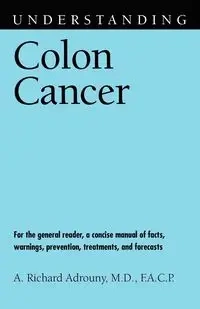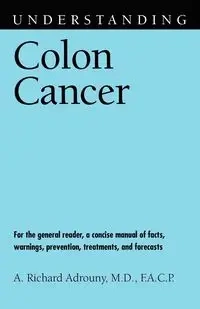Understanding Colon Cancer - Adrouny A. Richard
Understanding Colon Cancer - Adrouny A. Richard
EAN: 9781578064731
Symbol
422FGS03527KS
Autorzy
Adrouny A. Richard
Rok wydania
2010
Elementy
162
Oprawa
Miekka
Format
14.0x21.6cm
Język
angielski

Bez ryzyka
14 dni na łatwy zwrot

Szeroki asortyment
ponad milion pozycji

Niskie ceny i rabaty
nawet do 50% każdego dnia
Niepotwierdzona zakupem
Ocena: /5
Symbol
422FGS03527KS
Kod producenta
9781578064731
Autorzy
Adrouny A. Richard
Rok wydania
2010
Elementy
162
Oprawa
Miekka
Format
14.0x21.6cm
Język
angielski

For the general reader a concise manual of facts, warnings, prevention, treatments, and forecasts
For decades, while other cancers grabbed the headlines, colorectal cancer was quietly ignored. The lifetime risk of colorectal cancer in the general population is 2.5 to 5 percent. This means that twenty-five to fifty out of one thousand people will be stricken by this disease. Although data show that in America colorectal cancer incidence and mortality have been waning in recent decades, cancers of the colon and rectum still cause approximately 56,000 deaths annually. About 140,000 new cases are diagnosed each year.
It is plainly evident that colon cancer constitutes a large portion of all new cancer cases, a little more than 10 percent. It is the fourth most frequent type.
For the lay reader wishing to know more about this disease that has become more prominent in public attention, Understanding Colon Cancer gives concise information and explanation. It covers fundamental knowledge about occurrence, carcinogenesis, genetics, diagnosis, staging, prognosis, and treatment, as well as forecasting the kinds of diagnostic tests and treatments that may be developed.
It reviews demographics, high-risk conditions, the sequence from bowel polyps to cancer, polyposis syndromes predisposing people to colorectal cancer, and the genetics of the disease. Discussed in full detail are the warning signs of the disease and the tests used for screening and diagnosis (fecal occult blood test, barium enema, sigmoidoscopy, and colonoscopy). The stages of the disease are examined, along with theories of how colon cancer spreads.
Two chapters focus on treatments, including surgery and chemotherapy. An entire chapter devoted to early detection and prevention discusses standard ap-proaches, as well as such new or emerging strategies as vitamins, drugs, and genetic screening.
What lies in the future for diagnostic testing and therapy? Understanding Colon Cancer concludes with discussion that forecasts the potential of genetic screening and treatment, of "virtual colonoscopy," and of new chemotherapeutic drugs, vaccines, and monoclonal antibodies.
Richard Adrouny has a private practice in Los Gatos, California, and serves as the director of medical oncology at the Community Hospital of Los Gatos-Saratoga. He is a clinical assistant professor of medicine at Stanford University School of Medicine and has been published in such periodicals as the New England Journal of Medicine, American Journal of Medicine, and Annals of Internal Medicine.
EAN: 9781578064731
EAN: 9781578064731
Niepotwierdzona zakupem
Ocena: /5
Zapytaj o produkt
Niepotwierdzona zakupem
Ocena: /5
Napisz swoją opinię

